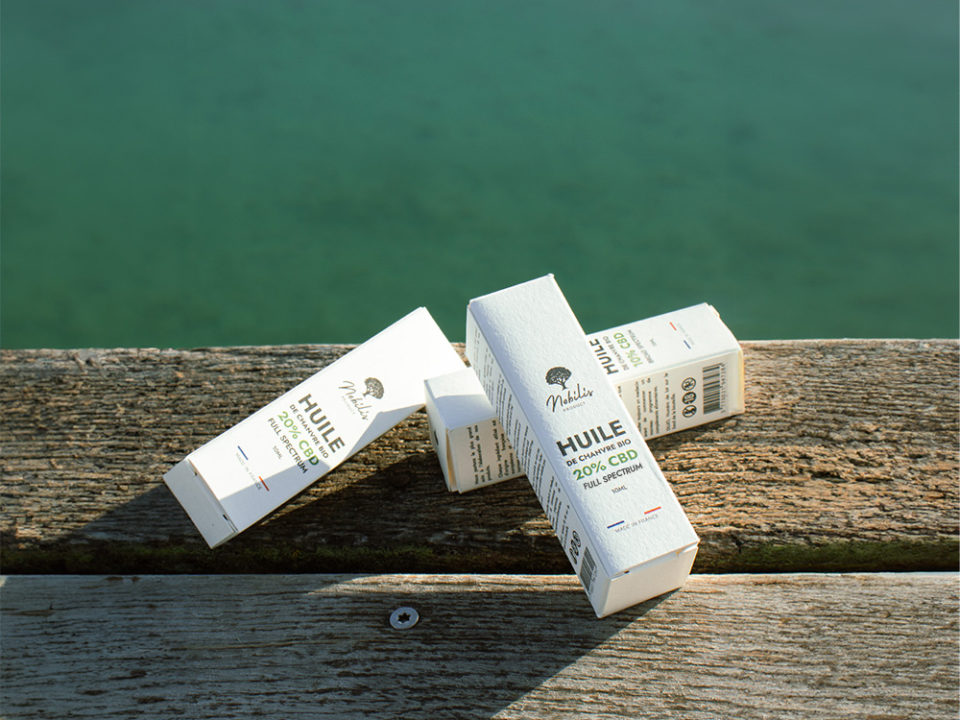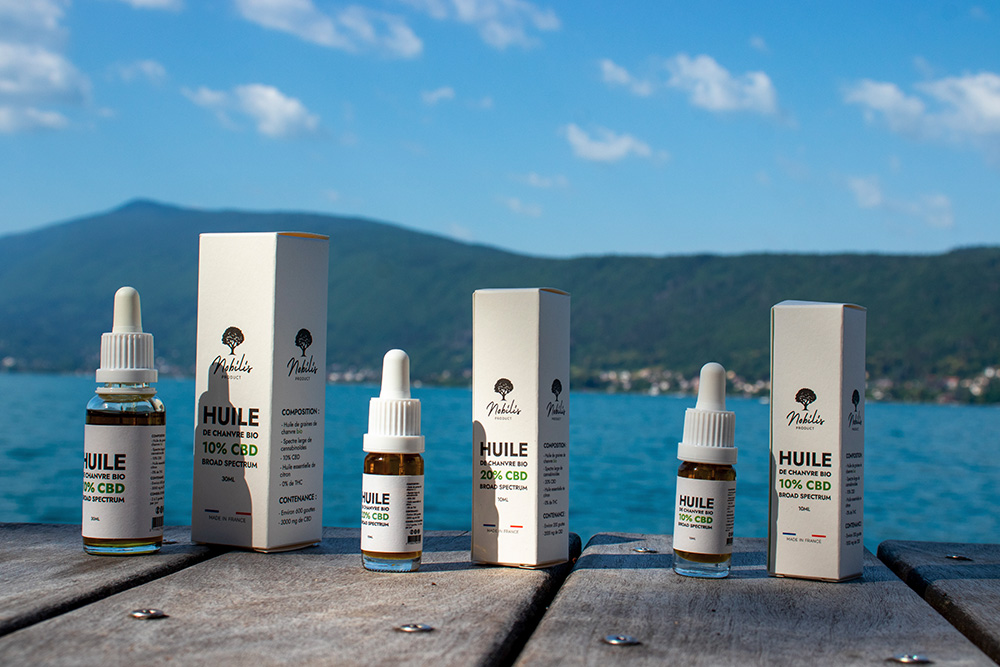Cannabis Sativa L. and all its derivatives have been used throughout the world since the dawn of time to treat a variety of ailments. Cannabidiol (CBD), the main active molecule in this medicinal plant, is the direct heir to all the therapeutic and well-being properties attributed to it.
CONTENTS
The everyday benefits of CBD
CBD oil has the advantage of being extremely versatile. A few drops under the tongue, mixed into your culinary dishes or even in your beauty products for skin application, or even in your e-liquid if you vapote. There' s something for everyone, depending on their needs.
Let's discover the potential benefits of CBD that you can enjoy every day.

💤 CBD, sleep quality and the fight against insomnia
CBD is not a sleeping pill. Unlike insomnia medications, it does not induce feelings of fatigue or direct sleep. Instead, cannabidiol is said to act on the main cause of poor-quality sleep. Stress.
Yes, thanks to its potential anxiolytic properties, a few drops of CBD oil just before going to bed could make it easier to fall back into Morpheus' arms. In fact, cannabidiol is said to help restore a little serenity amidst all the jumbled thoughts that invade the minds of insomniacs once their head is on the pillow. On this subject, discover our innovative "stress and sleep" formulation of our selection of Nobilis CBD oils.
🙏 CBD, mood harmony and serenity
It's not just in the evening before going to sleep that stress is rampant! Anxiety, irritability, difficulty concentrating and even depression are just some of the negative psychological conditions linked to stress.
Cannabidiol has the potential to act as a natural anxiolytic, but that's not all. Its interaction with our endocannabinoid system would also make it an excellent physiological stabilizer. If we take a holistic approach, a balanced body also translates into better emotional balance.
🍽 CBD and appetite?
Cannabis is known for its ability to stimulate the appetite. However, it's important to distinguish between THC and CBD. THC is responsible for the psychotropic effect of cannabis, and is also the culprit behind the notorious cravings it provokes.
CBD has been used for centuries to relieve intestinal inflammation, nausea and vomiting. In this sense, CBD oil could be indicated for people prone to gastric disorders, as well as those undergoing heavy treatments such as chemotherapy.
As for the appetite-suppressant action often attributed to CBD, it's true that its anti-stress action can help reduce stress-induced snacking.
🏃♀️ CBD and sports recovery
CBD oil is particularly appreciated by athletes. Its anti-inflammatory action helps reduce the intensity of pain sometimes caused by intense effort. It also enhances muscle recovery.
Without going so far as to say that CBD allows you to rapidly gain muscle mass, it is nevertheless reasonable to say that it promotes it! In fact, muscle anabolism takes place not during exercise, but afterwards, when the muscle is at rest.
Applied topically, mixed with lotion or pure, CBD oil is said to help relax muscles and reduce aches and pains.
🧠 CBD and pain
Studies suggest that cannabinoids could be a new class of drugs for the treatment of chronic pain[45, 46].
Cannabidiol significantly reduced inflammatory and chronic neuropathic pain in rodents[47].
It has also, particularly in combination with THC, shown promising results in the treatment of post-operative pain, chronic pain associated with multiple sclerosis, cancer, rheumatoid arthritis and neuropathic pain[48, 49, 50].
Sativex, a combination of CBD and THC as a sublingual spray, is effective in the treatment of neuropathic pain in multiple sclerosis patients and in cancer patients with advanced pain[51, 52].
Studies show that CBD and opioids work together to relieve pain[53].
🧠 CBD and addictions
It may come as a surprise to some, but this cannabis extract is said to be particularly effective in combating addictions, especially those caused by THC and nicotine.
The relaxing effect potentially induced by CBD consumption would make it possible to manage the abstinence period with greater serenity. In addition, cannabidiol is thought to act on the nervous circuits involved in addiction mechanisms.
CBD therefore increases the chances of successful withdrawal, whether from cigarettes or cannabis. What's more, CBD oil can be mixed with e-liquid and vaped, reproducing the gesture associated with addiction.
🔞 CBD and libido?
No, CBD isn't the next natural Viagra. Nevertheless, it could help rekindle the flame snuffed out by stress and everyday worries.
Wanting to make love isn't just a physiological question - it's a psychological one! Being in an erotic and sensual mood isn't always easy when your mind is cluttered with billions of "to-dos".
A few drops of CBD oil can help restore inner calm and a more aroused libido. What's more, some studies suggest that cannabidiol improves blood pressure. This could have beneficial effects not only on erection quality, but also on the intensity of sensations experienced.
👱♂️ CBD in your beauty routine
The world of cosmetics was one of the first to embrace cannabidiol. Major brands have been offering shampoos, moisturizers and skincare products containing hemp extracts for some time now .
Its action on the skin's sebaceous glands, as well as its potential anti-inflammatory properties, make CBD an ingredient of choice for beauty products designed to combat oily hair, acne and other skin inflammations.
CBD oil, when natural, can be applied directly to the skin or mixed with any base: shampoo, lotion or cream.
Cannabidiol, the hemp extract with a thousand virtues...
CBD is a molecule potentially rich in numerous health and well-being benefits. But what exactly is CBD?

First, a brief definition of CBD
Cannabidiol (CBD) is one of the many active molecules in cannabis. Not to be confused with its false twin, tetrahydrocannabidiol (THC).
In fact, CBD is :
- Completely legal: CBD is not subject to any particular restrictions in France, Europe or most other countries. When it is packaged in the presence of THC, as is the case with full spectrum CBD oils, the THC concentration is limited to 0.2%.
- Non-psychotropic: CBD is not responsible for the hallucinations caused by certain varieties of cannabis. THC, on the other hand, when consumed in significant quantities, induces changes in perception and behavior.
- Non-addictive & with no side effects: according to a report published by the WHO, CBD represents no health hazard and is not addictive.
The history of CBD began in the 1940s, but it wasn't until the 1960s, thanks to the work of Dr. Mechoulam, that the scientific community really began to take an interest in the molecule. And it was with the discovery of the endocannabinoid system that we began to understand its pharmacology and how it works.
The importance of the endocannabinoid system
At the end of the 80s, it was discovered that human beings - and the entire animal kingdom - are equipped with a vast network of receptors distributed throughout the body, from the brain to skin tissue, including most of our organs.
These receptors react specifically with the cannabinoid molecules extracted from cannabis. This vast network is known as the endocannabinoid system (ECS). And it seems to play an extremely important role in maintaining homeostasis.
Homeostasis is a state of ideal physiological equilibrium that keeps the body in good health. In other words, the SEC exerts a certain influence on the immune system and the central and peripheral nervous systems.
It is from this premise that most of the benefits of CBD are founded. Some properties have been proven, but most remain controversial.
The 10 potential therapeutic properties of CBD
Keep in mind that we are not doctors and are not qualified to prescribe CBD oil to treat any disease. Our job is simply to collect the information we find in scientific journals. You'll find all our references at the bottom of the page.
#1. Anticonvulsant and antiepileptic
In the United States, the use of therapeutic cannabis has been democratized thanks to the story of Charlotte Figi, a little girl suffering from Dravet syndrome, a common form of childhood epilepsy.
Before being treated with cannabis oil, the child suffered over 300 seizures a month. These were reduced to just 2 or 3 a month. The remedy in question was made from a strain low in THC but rich in CBD.
There is currently a cannabidiol-based medication available for certain epilepsy patients. In France, Epidiolex has an AMM (Autorisation de Mise sur le Marché). However, you won't find it in pharmacies. It would appear that certain disagreements over its selling price are preventing it from being marketed...
#2. Antispasmodic
The history of cannabidiol is linked to that of cannabis and goes back thousands of years. Its therapeutic use has not been accurately dated, but the plant does feature in the oldest medical treatise, the Shen nung pen ts'ao king. Written in 2800 BC.
In this collection, cannabis is described as particularly effective in relieving vomiting. And according to some archaeological digs, Cleopatra used a cannabis-based decoction to relieve menstrual pain.
The properties of cannabis have been known to many cultures. Indeed, Indian Ayurvedic medicine also mentions the plant. In the West, the use of cannabidiol is very recent, but numerous testimonials already attest to the molecule's effectiveness in treating nausea and vomiting.
#3. Antipsychotic
Cannabidiol has long been shunned for its kinship with tetrahydrocannabinol, better known as THC. While it's true that the two substances are synthesized from the same stem cell and share the same chemical formula , they don't have the same effect at all.
In his work on the endocannabinoid system, Dr Mechoulam has demonstrated that CBD and THC are different in every respect.
CBD thus has many chemical similarities with atypical anti-psychotropic drugs. And it is on this basis that numerous studies have demonstrated the value of cannabinol in the treatment of certain psychoses, notably schizophrenia.
Experiments carried out on volunteer patients are extremely encouraging, but we'll have to wait a little longer before the first official CBD-based neuroleptics appear.
#4. Antidepressant
Among CBD's repeatedly cited benefits is its antidepressant action. According to some testimonials, cannabidiol helps restore joie de vivre and balance emotions, just as some antidepressants do, but without the side effects.
Although it has never been proven, depression is thought to be caused by a so-called monoaminergic imbalance. In other words, a deficiency of certain hormones: dopamine, serotonin and noradrenalin. By acting on the brain, traditional antidepressants help to restore this balance.
CBD, for its part, is said to stimulate the synthesis of serotonin. A hormone that some unequivocally call "the hormone of happiness". Selective serotonin reuptake inhibitors are the antidepressants most commonly prescribed to suicidal people. Like venlafaxine or duloxetine, they induce an almost immediate feeling of well-being.
#5. Anxiolytic
Benzodiazepines are generally used to combat anxiety, whether physical or psychological. These anxiolytics induce a state of rapid relaxation by acting directly on GABA, a neuromodulator that prevents prolonged excitation of neurons.
These drugs are sometimes used to stop convulsive seizures caused by epilepsy. And it's precisely because CBD also acts on GABA that it's also recommended for treating certain forms of epilepsy. That's why cannabidiol is also considered an excellent anti-stress agent.
The pharmacology of GABA inhibitors is complex, and CBD's action on this neurotransmitter is not yet fully understood by the scientific community. Nevertheless, according to testimonials, it provokes a subtle yet soothing sensation of well-being and serenity very quickly.
#6. Neuroprotective effect of CBD
Damage to our neurons and their synapses usually results in minor memory lapses or motor problems. Sometimes, however, the after-effects are more serious, leading to Alzheimer's or Parkinson's disease.
These neurodegenerative diseases have no treatment. In fact, neurogenesis is not a normal, natural process in adulthood. The only solution is to protect existing neurons and prevent their deterioration as far as possible. To achieve this, a healthy lifestyle is obviously essential, as it is the most effective way of combating the number 1 enemy of our neurons: oxidative stress.
And some studies have highlighted the possible antioxidant properties of CBD. These observations must be qualified, however, as they were carried out on rodents. Nevertheless, the initial results are promising. What's more, several testimonials from around the world agree that CBD improves the living conditions of Parkinson's and Alzheimer's sufferers.
#7. Anti-inflammatory effect of Cannabidiol
Another benefit widely acclaimed by CBD aficionados is its anti-inflammatory action, which is often associated with its pain-relieving and neuroprotective properties. In fact, inflammation is an immune response triggered by various stimuli throughout the body.
Thus, the anti-inflammatory properties of CBD could provide relief for patients suffering from a disease whose symptoms are linked to prolonged inflammation :
- It may be an autoimmune disease, such as multiple sclerosis. Motor, sensory, cognitive and visual disturbances are caused by inflammation of the axons in the central nervous system. A cannabidiol-based treatment is sometimes prescribed to patients: Sativex.
- Joint pain such as osteoarthritis, arthritis and rheumatism is also the cause of prolonged inflammation. In this particular case, the benefits of CBD have not yet been scientifically proven, but once again, numerous testimonials point to positive effects.
- Inflammations of the digestive tract, such as irritable bowel syndrome (IBS), Crohn's disease (which affects the intestines) or constipation. Here, several studies have demonstrated the efficacy of CBD in treating these types of ailments, although the experiments were carried out in vitro and do not allow any definitive conclusions to be drawn.
#8. Analgesic and pain-relieving effects?
The terms analgesic and analgesic are generally used synonymously, to refer to a painkiller. But in reality, it's interesting to know that an analgesic reduces pain, like paracetamol or aspirin, while an analgesic suppresses sensitivity to pain, like morphine.
For its part, cannabidiol seems to be able to reduce pain, thanks in particular to its anti-inflammatory action, and suppress sensitivity to pain. In fact, it reacts with TRPV1-type receptors in our peripheral nervous system, which are responsible for transmitting the nerve impulses associated with the sensation of pain.
These neurotransmitters are involved in many pathologies caused by hypersensitivity of pain pathways. And CBD could therefore help in the case of chronic pain, particularly in patients suffering from fibromyalgia, which is a disease that combines muscle and joint pain.
#9. Anti-angiogenesis, anti-carcinogenic
Angiogenesis refers to the formation of new blood vessels from existing ones. This physiological process is perfectly normal, but sometimes it serves the interests of cancer cells rather than healthy ones. These new vessels accelerate the growth of malignant tumors and the development of metastases.
Some studies have shown that CBD is capable of inhibiting the mechanism of angiogenesis, demonstrating the molecule's therapeutic potential in the treatment of certain cancers. It is also suspected of acting on the apoptosis of diseased cells, i.e., their degradation.
At present, however, scientific evidence remains insufficient, although excellent results have been observed in colon cancer patients.
#10. Seboregulator
Several studies have shown that CBD is capable of regulating the action of sebocyte cells. It limits sebum secretion when it is in excess, but also stimulates it when it is lacking.
That's why so many cosmetics are formulated with hemp and, more specifically, CBD. This molecule, with its anti-inflammatory properties, is an ingredient of choice in any acne-fighting formula.
By the way, the benefits of CBD on the skin are legally recognized by French law. The molecule is an anti-sebum, antioxidant and moisturizing agent.
Our sources
- Charlotte Figi's story;
- Article from the website of the Belgian French-speaking league against epilepsy concerning the effects of CBD on the disease;
- Study of CBD's action on GABA and its potential anxiolytic properties
- Study on CBD as a neuroprotectant and possible antioxidant
- CBD in arthritis patients;
- Scientific article about CBD as an analgesic;
- Research about CBD to fight cancer;
- CBD to combat addiction.
